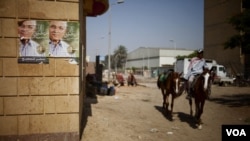GIZA, Egypt - Egypt's political transition has hit more snags, with the ruling military council entrenching its position even as it promises to hand power to a civilian leadership. But one group in Egypt still holds hope that change will come.
Egypt may be in flux, but out on the sands of the Giza Plateau, the Great Pyramids are a reminder that history is a long, slow process.
Hany Mohamed El Sawi is a desert horseman. Sitting in an open hut offering shade from the scorching sun, el Sawi says Egyptians will be able to overcome anything. “We are a steadfast nation,” he says, 7,000 years old and “we're still standing.”
El Sawi leads tourists through the desert by horse and camel. It's a family business, generations long. But since a revolution rocked Egypt 16 months ago and deposed long-time leader Hosni Mubarak, he and his fellow riders have seen their income all but dry up.
Tourists have stayed away, afraid of the instability and lack of security. Even Egyptian customers are fewer, as the economy declines.
Which goes to explain why in the presidential vote that ended Sunday, many like el Sawi threw their support to the secular, old guard candidate Ahmed Shafiq.
He says Shafiq is on the scene - he understands tourism, he'll make it work.
El Sawi's relative Ramadan, who owns one of the family's stables, also voted for Shafiq. Even though Islamist candidate Mohamed Morsi gave assurances he is pro-tourism, Ramadan worries a Morsi victory would be another blow to his business.
“He doesn't like tourists to visit our area. Our country. Not only our area, our country. We hope Ahmed Shafiq wins. Not Morsi. If he wins, this area, maybe all the horse was killed,” said Ramadan.
As he walks through the stables, the horses seem healthy and content. Often good businessmen, the riders are thought by many to be a conservative group, never more so than during the height of the uprising last year. Horse and camel riders took to Tahrir Square wielding whips against anti-Mubarak protesters, solidifying their reputation as supporters of the status quo.
But el Sawi insists that the revolution was huge step forward for Egypt.
He praised the fact that now there is democracy, he can cast his ballot for whichever president and parliament he wants.
Unlike others, el Sawi says he does not mind that a Mubarak-era court dissolved the first post-uprising parliament last week. He says he will just vote again.
Despite the power struggle between the ruling military council and its Muslim Brotherhood opposition, back in the stables, Ramadan also imagines a future in which regular Egyptians have the final say in who runs the country.
“After four years, if he doesn't do good things for all the country, not only for us, for the country - we'll change him. This is everything in our hands,” said Ramadan.
With the events of recent days, Ramadan may seem overly optimistic. But then, these riders are taking the long view.
Egypt may be in flux, but out on the sands of the Giza Plateau, the Great Pyramids are a reminder that history is a long, slow process.
Hany Mohamed El Sawi is a desert horseman. Sitting in an open hut offering shade from the scorching sun, el Sawi says Egyptians will be able to overcome anything. “We are a steadfast nation,” he says, 7,000 years old and “we're still standing.”
El Sawi leads tourists through the desert by horse and camel. It's a family business, generations long. But since a revolution rocked Egypt 16 months ago and deposed long-time leader Hosni Mubarak, he and his fellow riders have seen their income all but dry up.
Tourists have stayed away, afraid of the instability and lack of security. Even Egyptian customers are fewer, as the economy declines.
Which goes to explain why in the presidential vote that ended Sunday, many like el Sawi threw their support to the secular, old guard candidate Ahmed Shafiq.
He says Shafiq is on the scene - he understands tourism, he'll make it work.
El Sawi's relative Ramadan, who owns one of the family's stables, also voted for Shafiq. Even though Islamist candidate Mohamed Morsi gave assurances he is pro-tourism, Ramadan worries a Morsi victory would be another blow to his business.
“He doesn't like tourists to visit our area. Our country. Not only our area, our country. We hope Ahmed Shafiq wins. Not Morsi. If he wins, this area, maybe all the horse was killed,” said Ramadan.
As he walks through the stables, the horses seem healthy and content. Often good businessmen, the riders are thought by many to be a conservative group, never more so than during the height of the uprising last year. Horse and camel riders took to Tahrir Square wielding whips against anti-Mubarak protesters, solidifying their reputation as supporters of the status quo.
But el Sawi insists that the revolution was huge step forward for Egypt.
He praised the fact that now there is democracy, he can cast his ballot for whichever president and parliament he wants.
Unlike others, el Sawi says he does not mind that a Mubarak-era court dissolved the first post-uprising parliament last week. He says he will just vote again.
Despite the power struggle between the ruling military council and its Muslim Brotherhood opposition, back in the stables, Ramadan also imagines a future in which regular Egyptians have the final say in who runs the country.
“After four years, if he doesn't do good things for all the country, not only for us, for the country - we'll change him. This is everything in our hands,” said Ramadan.
With the events of recent days, Ramadan may seem overly optimistic. But then, these riders are taking the long view.




